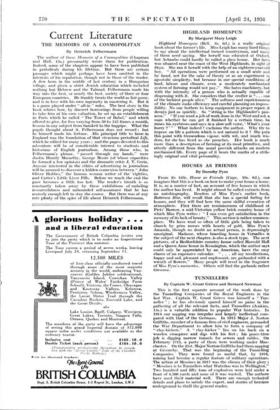• Highland Homespun (Bell, Ss. 6(1.) is a really original
book about the farmer's life. Miss Leigh has many hard things 'to 8ay about the intellectual turned countryman, and many of them need- saying. She herself was educated at Oxford, but Achnabo could hardly be called a glass house. Her farm was situated near the coast of the West Highlands, in sight of Skye. She.ran it herself with the help of an eighteeniyear-old boy. "All operations were performed on a small scale and by hand, not for the sake of theory or :SS an experiment in apostolic simplicity; but because in Cur special conditions of land, labour and climate, even a moderately mechanised system of farming would' notpay." She hates machinery, but with the intensity of a person who is actually capable of dispensing with it. She considers that the . crofter is 'f. . . one of the luckiest people alive." The softness and capriciousness of the climate make efficiency and careful planning an imposs- ibility. No one bothers to keep equipment in proper repair, it decays justas quickly. So "string is the Highlander's pan- acea." "If you want a job of work done in the West and ask a man whether he can get it finished by a 'certain time, he raises his eyebrows and says in a slow soft voice, What's your hurry ? " What indeed ? exclaims the author. Why try to impose on life a pattern which is not natural to it ? She puts this point with tremendous vigour, with wit, and much wis- dom, for she has lived as she preaches. Her book is much more than a description of farming at its most primitive, and utterly different from the usual peevish attacks on modern mechanised life. Every page of it bears the marks of a strik-
ingly original and vital personality. •


















































 Previous page
Previous page